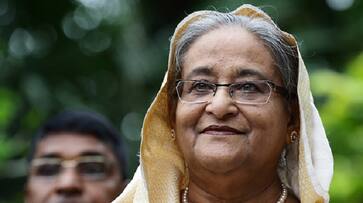Bangladesh PM Hasina said Myanmar had given a verbal commitment to take back Rohingya Muslims who have fled a military crackdown she described as "tantamount to genocide and crimes against humanity".
United Nations: Bangladesh Prime Minister Sheikh Hasina has criticised Myanmar for failing to fulfil its commitment to take back Rohingya Muslim refugees who had fled to Bangladesh due to ethnic and religious persecution in their home country.
PM Hasina said Myanmar had given a verbal commitment to take back Rohingya Muslims who have fled a military crackdown she described as "tantamount to genocide and crimes against humanity".
Hasina made the remarks in her speech at the annual gathering of world leaders at the United Nations on Thursday, even as the UN Human Rights Council agreed to set up a team to collect evidence of alleged crimes that could later be used to prosecute suspected perpetrators.
"The world cannot ignore or remain silent over the plight of the Rohingya people driven from their homes in Myanmar and sheltering in Bangladesh," Hasina, said as she urged world leaders for an early and peaceful solution to the massive refugee crisis.
"We are disappointed that despite our earnest efforts we have not been able to begin Rohingya repatriation in a permanent and sustainable manner. Myanmar is one of our neighbours. From the outset, we have been trying to find a peaceful solution to the Rohingya crisis through bilateral consultations," said the Bangladeshi premier noting that her country has concluded three refugee repatriation arrangements with Myanmar, UN News reported.
"Despite their verbal commitment to take back the Rohingya, in reality the Myanmar authorities are yet to accept them back," Hasina said.
Hasina also recalled the five-point proposal she presented to the UN General Assembly last year, which outlined a durable and peaceful solution for the plight of the forcibly displaced Rohingya.
She said Bangladesh is hosting some 1.1 million members of Myanmar's minority Rohingya Muslim community and, supported by humanitarian organisations, including UN agencies, is providing them with food, clothing, healthcare and security. Work is also underway to provide improved housing, as well as education and other services.
"I call upon international organisations to join hands with us in this initiative. I also seek their assistance to help relocate the Rohingya to the facility," she added.
Most of the Rohingya arrived in Bangladesh since August, 2017 when attacks by Rohingya militants led to a major crackdown by Myanmar's security forces that triggered a massive cross-border exodus of refugees.
Last Updated Sep 28, 2018, 6:50 PM IST









![Salman Khan sets stage on fire for Anant Ambani, Radhika Merchant pre-wedding festivities [WATCH] ATG](https://static-gi.asianetnews.com/images/01hr1hh8y86gvb4kbqgnyhc0w0/whatsapp-image-2024-03-03-at-12-24-37-pm_100x60xt.jpg)
![Pregnant Deepika Padukone dances with Ranveer Singh at Anant Ambani, Radhika Merchant pre-wedding bash [WATCH] ATG](https://static-gi.asianetnews.com/images/01hr1ffyd3nzqzgm6ba0k87vr8/whatsapp-image-2024-03-03-at-11-45-35-am_100x60xt.jpg)


